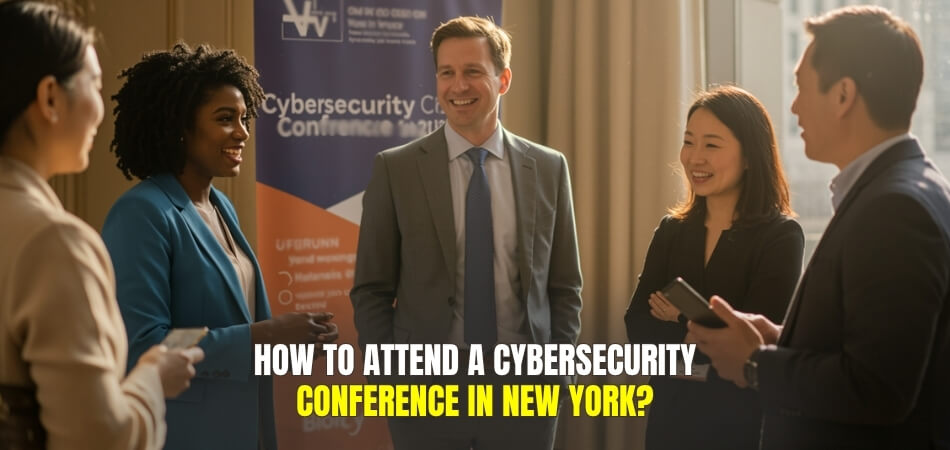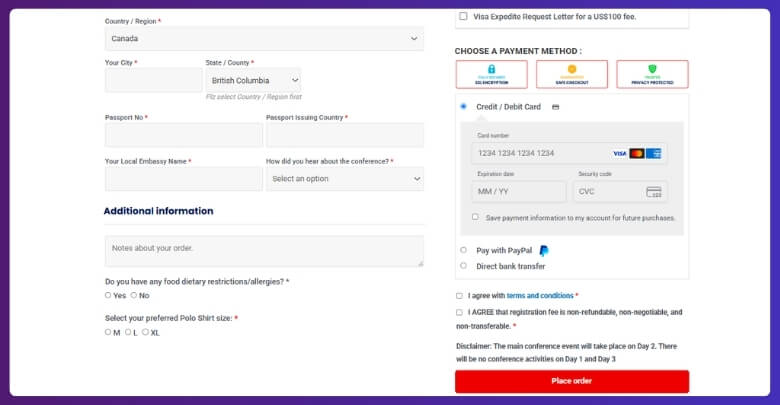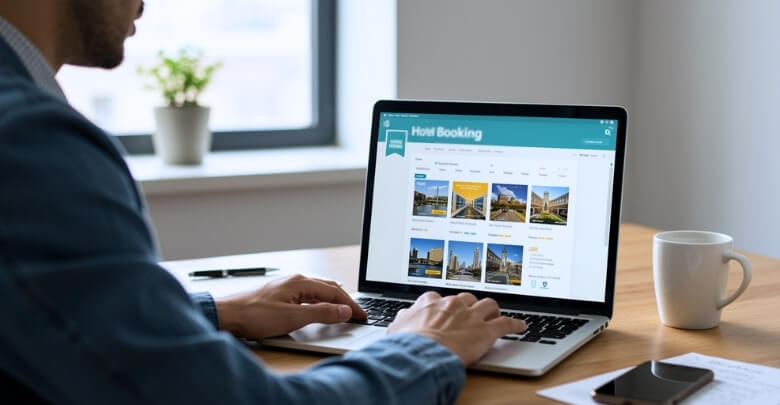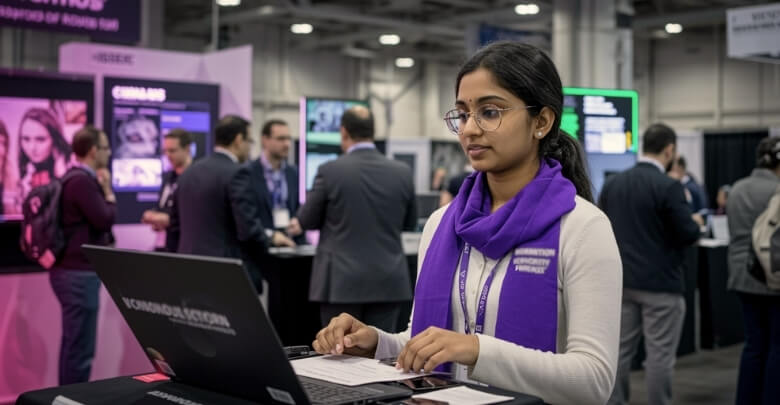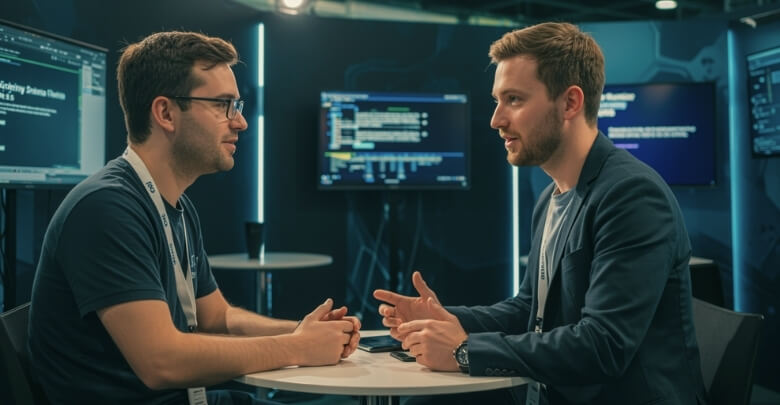Cybersecurity conferences in NYC bring together smart people who care about online safety. These events are packed with expert talks, hands-on sessions, and real-time discussions about internet threats. If you’re planning to attend one, you might already be thinking about how to attend a cybersecurity conference in New York?
Attend a cybersecurity conference in New York by finding a trusted event, checking its website for topics and ticket info, registering online, and planning your sessions. Arrive early, bring essentials, dress simply, and talk to others to learn more.
If you want to join a cybersecurity conference in New York, this article covers everything you need to know. It explains how to register, what to bring, and tips for a smooth experience. Keep reading to find all the important details that will help you attend confidently and enjoy the event fully.
How to Attend a Cybersecurity Conference in New York?
Cybersecurity conferences are a great way to learn about internet safety today. These events often bring smart people together to share ideas and tips. New York hosts many of them every year in different locations. If you’re curious how to attend one, keep reading below.
Find a Good Event
Start by looking for trusted events that match your interests. Some might focus on hacking, while others cover general online safety. Event pages often give full details about topics, speakers, and ticket prices. If you’re browsing different conferences in New York, you might come across cybersecurity options mixed in with other tech events. Choose one that feels right for you and make sure it’s a real event with a clear website.
Check the Event Website
Most events have an official website where everything is explained. This includes the date, time, venue, and how to register. You’ll also find the speaker list and session topics. Look for a contact page in case you have questions. Some sites may even offer a small discount for early sign-ups or group bookings. Read everything carefully so you don’t miss anything important before registering.
Register Online
Once you’ve found a suitable event, the next step is registration. Most conferences offer an online form to fill out with your name and contact details. Some might ask you to create an account. After that, you usually get a confirmation email. Make sure the email includes your ticket or a QR code. Save this somewhere you can access easily on the event day.
Pick Your Sessions
Bigger events often have many sessions happening at the same time. Read the session descriptions and choose what you’d like to attend. If you like hands-on things, check if they offer live demos or small group workshops. Pick a few topics in advance so you don’t feel lost on the event day. Some apps let you create a personal schedule from the session list.
Prepare Your Essentials
Before heading out, pack the basics. Bring your ID, ticket (printed or digital), charger, and a notebook if you like to write. Some places provide snacks, but it’s smart to carry a water bottle or something small to eat. Double-check the venue’s rules about bags or electronics. Being prepared saves time and makes your day smoother at the event.
Dress Smart and Simple
There’s no need for formal clothes, but dressing clean and presentable helps you feel confident. Choose something comfortable since you may walk or stand a lot. Most people go for casual shirts, jeans, or simple sneakers. Just avoid anything too flashy or noisy. Think of it like visiting a library or tech fair—you want to blend in while feeling good.
Join the Event Early
Try to arrive at least 20–30 minutes before the start time. This helps you avoid last-minute issues like long lines or traffic delays. Some conferences offer early check-in or welcome sessions. These are great chances to meet people before things get busy. Early arrival also gives you time to explore the venue and pick your seat for the first talk.
Talk to Others
Saying hello to someone near you is a good way to start. You can ask if they’ve attended before or what sessions they like. Conversations like this are easy and don’t need special words or skills. Many people also come alone and are happy to chat. Even a smile can open up a friendly conversation with someone. New friends or useful tips often start with just one small hello.
Stay Updated After
When the event ends, that doesn’t mean your learning stops there. Some websites send follow-up videos, documents, or contact details later. It’s smart to check your email or revisit the event page again. Staying connected helps you find new events or future updates. A lot of people share notes online after attending a good event. Keep checking now and then to see what’s new or useful.
Cybersecurity events help you learn how to stay safe online every day. They also let you meet others who like tech and smart ideas. You don’t need to know everything before going to one. Just start with what you have and enjoy the event.
What Documents Might You Need to Join a Cybersecurity Event in New York?
Planning to attend a cybersecurity event in New York is always exciting. But before you walk into the venue, you’ll need a few documents ready. These papers help event organizers confirm your registration and identity smoothly.
- Event Registration Confirmation: Always carry your ticket or email confirmation. Organizers will check this first before letting you inside the event venue.
- Valid Photo ID: Bring a government-issued ID like a passport or driver’s license. They use it to confirm your identity at the entrance.
- Proof of Payment: Keep a digital or printed receipt if you paid for your ticket. This can help solve any mix-up with your registration.
- Visa and Travel Papers: International visitors should carry their visa, passport, and travel documents. These will also be needed at airports and hotels in New York.
- Invitation Letter (If Any): Some events offer official invitation letters. If you have one, show it during check-in for quicker processing and added clarity.
- Work or School Letter (Sometimes Needed): Certain events may ask for a letter from your workplace or school, just to confirm the purpose of your visit.
- Health and Safety Pass (If Required): Depending on the organizer, a health pass or vaccination card might still be required, especially for indoor venues.
Make sure all your documents are packed neatly before your trip. It’s better to double-check everything the night before the event. Missing one paper can cause delays at the entrance. Being prepared helps you enjoy the event without stress.
How to Register Successfully for a Cybersecurity Event in NYC?
Registering for a cybersecurity event in NYC is not very hard. You just need to follow a few simple steps the right way. If you miss something, it can delay your entry to the venue. This guide will help you register step by step without confusion.
Step 1: Search for a Real Event
Start by using trusted event platforms to look for upcoming cybersecurity events. These platforms include Eventbrite, Meetup, or the official conference websites. Make sure the event is happening in New York City and is not fake. Carefully read the event description, date, and location before doing anything else. This will help you avoid scams or wrong links and save your time.
Step 2: Open the Event Page
After finding a real event, go to the official event page directly. You’ll usually find important details like speakers, venue, and time there. Read the whole page so you understand what to expect during the event. Look out for ticket rules, attendance limits, and extra details like workshops. Knowing everything in advance helps you make better choices while registering.
Step 3: Click “Register” or “Get Ticket”
Once you are on the official page, look for the registration button. It may say “Register,” “Get Ticket,” or “Attend Now.” Clicking that button takes you to the next step, where you’ll enter your information. Always click once and don’t refresh the page during this part. It’s important to wait while it loads to avoid double submissions or errors.
Step 4: Fill Out the Registration Form
Now you’ll see a form where you need to type your details clearly. This usually includes your full name, email, city, and sometimes your phone number. Some events also ask you to pick the topics or sessions you want. Read each field carefully and check your answers before submitting. Mistakes in this part can cause problems later when entering the event.
Step 5: Make the Payment (If Needed)
Some events are free, but others may ask you to pay online. When payment is needed, make sure the page is secure before typing card details. It should have a lock icon and begin with “https” in the address bar. After payment, wait for the confirmation message to appear. Save any receipt or message you see after your payment is done.
Step 6: Check Your Email Inbox
After registration, open your email inbox and search for confirmation details. You’ll often receive a ticket, entry QR code, or event guide. It’s a good idea to save this email or print it out. This helps avoid problems when checking in at the event. If you don’t see the email, also check your spam or junk folder.
Step 7: Get Everything Ready
Before event day, organize your documents, like your ID and registration ticket. Some events may require printed tickets, while others allow mobile check-in. Keep everything in one place so you don’t lose anything important. Leave early on the event day to avoid last-minute stress. Being ready means you can enter smoothly and enjoy everything from the start.
Always follow each step with care to avoid registration problems later. It’s better to stay prepared than face issues at the event entrance. A small mistake in your details can delay your check-in badly. Just follow the guide and you’ll be all set to attend.
How to Access Workshop Schedules and Session Details Before the NYC Cybersecurity Conferences?
Finding your way through a big cybersecurity event can feel a bit confusing. There are often many sessions, speakers, and workshops happening at the same time. That’s why it’s important to get the schedule before the event starts. Keep reading to find out how you can easily check everything in advance.
- Go to the event’s official website and check their agenda section for daily updates, speaker names, and timing details about all sessions.
- Many conferences use mobile apps that show full schedules and send alerts about session changes or room updates in real time.
- Some events email the full schedule once you complete your registration, so check your inbox and keep that email safe.
- You can also download PDF versions of the agenda from the conference website, if they offer one, which is easy to print or save offline.
- Event organizers sometimes post daily session updates on social media, so follow their official accounts for the latest news and reminders.
- Ask the support team via email or live chat on the website if you can’t find the updated schedule or session information anywhere.
- If you’re attending in a group, check if one of your friends has already downloaded or received the schedule so you can copy it easily.
Always check the schedule a day before the event begins. It helps you plan your time without missing your favorite sessions. Having the right info also saves you from last-minute confusion. Make sure to stay updated with any changes.
How to Find Accommodation Near Cybersecurity Conference Venues in NYC?
New York has many places to stay, but finding the right one near your event can take a bit of planning. Some are expensive, some are simple, and others offer good deals. It really depends on what you need. Let’s look at some easy tips to help you choose better.
Look at Nearby Hotels
Plenty of hotels sit close to big event venues across New York City. You can use Google Maps or hotel websites to check which ones are nearest. Short travel time can help you avoid early-morning stress or long rides. Even small hotels can be useful if they’re close enough. Just remember to compare more than one option before picking. It’s easier when you know the place is nearby and easy to reach.
Check Online Reviews
Reviews tell you a lot about the place before you book a room. Many people write about whether the room was clean, noisy, or too small. Others talk about how helpful the staff were or if breakfast was included. Reading these reviews can help you avoid bad choices. Try looking on trusted sites like Booking or TripAdvisor. It’s smart to read both good and bad reviews for a better understanding.
Set a Budget
Before booking a place, think about how much you want to spend overall. While booking your stay, it’s helpful to factor in the total cost of attending a cybersecurity conference in New York, including your accommodation, meals, and transportation. That way, you don’t end up surprised by small extra charges. Many hotels add service fees or city taxes that increase the total bill. A clear budget keeps everything simple and stress-free.
Use Public Transport
Some cheaper hotels might be a little far, but still easy to reach. New York has great trains and buses that go almost everywhere. You can pick a hotel that’s near a subway station, even if it’s not right next to the venue. Just check the travel time during rush hour. Staying farther can still be smart if your ride is short and easy every day.
Look at Other Options
Hotels are not the only places you can stay during your trip. Websites like Airbnb or Hostelworld offer rooms, shared spaces, or even small apartments. These can be cheaper and feel more like home. Some of them even come with a small kitchen where you can cook. Just make sure to read all the rules and check-in times before booking anything.
Finding the right place to stay near your cybersecurity conference can be simple if you plan early and stay within your budget. A good location, clean room, and easy transport can make your experience much better. Don’t forget to read reviews and compare a few options before booking. With a little effort, you can enjoy the event without worrying about where you’ll sleep at night.
Can You Volunteer at a Cybersecurity Conference in New York?
Cybersecurity conferences often need helping hands to keep things running smoothly. Volunteering is one way to get involved, meet people, and learn something new. You don’t have to be an expert to help out at these events. Want to know how it works? Keep reading below.
Search for Openings
Start by checking the event’s official website for any volunteer listings. Look under the FAQ or contact section for details. Some conferences post forms asking for your name, contact, and why you want to help. Openings often include roles like registration help, tech support, or guiding guests. These spots can fill fast, so check early. You can also email the organizers if no info is listed online.
Know the Tasks
Volunteer jobs can be simple, but still very important to the event. You might welcome people at the door or pass out badges to guests. Some volunteers help speakers with their setup or direct people to the right room. Others check tickets or hand out flyers during the breaks. Knowing your tasks ahead of time helps you stay ready and confident. Every role helps make the event better.
Send a Request
Once you find a chance to volunteer, send your request right away. Fill out the form clearly and explain why you want to help. Keep your message short, friendly, and easy to understand. It’s okay if you don’t have experience just be honest and show interest. Some events may ask for a short online meeting or email chat. If they agree, they’ll send more details about your role.
Show Up Early
On event day, try to arrive at least 30 minutes before your shift. This gives you time to meet the team and understand your job. Some events give you a quick training or tour before things begin. Being early also shows you’re serious about helping. It’s better to wait a little than to be late or confused. Organizers will trust you more if you’re prepared.
Enjoy the Experience
While helping out, take time to enjoy the event around you. Listen to talks, meet new people, and ask questions when you can. Volunteering gives you free access to cool sessions and smart speakers. You may even get a thank-you gift or certificate at the end. Helping others while learning new things makes the experience feel even more fun and special.
Volunteering at a cybersecurity event is a great way to learn and connect. It’s simple to apply, and you don’t need much to get started. Just be kind, ready, and open to helping where it’s needed. With the right attitude, it can be a fun and useful time.
What Are Some Common Mistakes to Avoid at Your First Cybersecurity Event in NYC?
Stepping into your first cybersecurity event in NYC can be exciting but also overwhelming. With so much going on, it’s easy to make simple mistakes that can affect your experience. Planning ahead makes a big difference. Keep reading to learn what to avoid.
Missing Important Sessions
Many people walk around the venue and miss keynotes or expert panels. These sessions often share useful updates and new ideas in the cybersecurity field. Arriving late or skipping talks can make you miss valuable insights. Always check the full event schedule early and mark the ones you really want to attend. Some talks happen only once, so you may not get a second chance.
Ignoring the Right Fit
Some attendees join without reading the event’s focus or theme. One common mistake is joining events without checking if you’re among the ideal candidates for cybersecurity conferences in New York, which can lead to missed learning opportunities or feeling out of place. It’s better to choose events that match your current level or interests. That way, you enjoy it more and understand the topics better.
Avoiding Conversation
There’s more to an event than just watching talks and panels. Talking to people can help you learn faster and hear new opinions. Don’t stand alone all day or only check your phone. Smile, say hello, and ask questions. Most people are open to chatting, especially at breaks or in small sessions. You may meet someone who shares tips or tells you about another good event.
Forgetting to Take Notes
Listening is great, but it’s easy to forget details later. Bring a small notebook or use your phone to write key points. You don’t have to write every word—just the ideas or names you want to remember. If you hear about tools, websites, or speakers, write them down. These notes can help you after the event when you’re looking back at what you learned.
Not Following Up
Meeting people is just the start. After the event, send a quick message or email to anyone you spoke with. It helps build a real connection and shows you’re interested. Even a simple “Nice meeting you” can go a long way. If someone shared advice or a link, thank them again. Many strong connections begin with small follow-ups like this.
Everyone makes a few mistakes at their first event, and that’s okay. What matters is learning from them and doing better next time. Keep these tips in mind so you feel more ready. Make your experience fun, smart, and stress-free.
What Should You Do After Attending the Cybersecurity Conference in NYC?
Learning and connecting at a cybersecurity conference in NYC is a big step. But the real value often comes after the event ends. What you do next can help you grow even more. Keep reading for some helpful tips.
Sort Your Notes
After getting home, take time to read through all your notes again. Mark the most useful tips, tools, or websites mentioned during sessions. If you scribbled fast, rewrite some points clearly. This helps you remember things better and puts everything in order. Organized notes are easier to use later when you want to try something new or share what you learned.
Connect With People
If you talked to someone interesting at the event, send them a short message. It could be a quick “Nice meeting you” or a thank you note. Keeping in touch is a good way to grow your network. You never know when one of those contacts could help or share a useful update. Don’t wait too long, send your message within a few days.
Share What You Learned
Telling others about the conference helps you remember the best parts. You can talk with friends, coworkers, or post on social media. Just pick 2–3 things you found interesting or helpful. People will appreciate it, and you might even help someone else. Sharing is also a great way to feel proud of what you learned and boost your confidence.
Try Out New Skills
If the conference showed you tools or ideas, now is the time to try them. Pick one simple thing and give it a go. You don’t have to do everything at once—small steps are fine. Using what you learned right away keeps it fresh in your mind. It also shows you how helpful the event really was.
Make a Plan
Think about how the event fits into your future goals. Do you want to attend more conferences? Are there topics you now want to explore? Make a short list of next steps, like signing up for a free course or reading a blog. A clear plan keeps you moving forward instead of forgetting everything in a few weeks.
Doing small things after a conference makes a big difference over time. It helps you use the ideas, build stronger contacts, and stay on track. Don’t let the event end with just memories. Turn what you learned into something useful.
Tips for Making Valuable Connections During the Cybersecurity Conference in NYC
Meeting new people at a cybersecurity conference in NYC can feel a little scary. But with a few simple steps, you can feel more confident. Making strong connections doesn’t mean saying fancy things. Read these tips to make it easier.
- Start with a smile and a simple hello when you see someone standing alone or looking around for someone to talk to.
- Ask friendly questions like “Which session did you like most?” to keep the conversation going without sounding too serious or forced.
- Bring a few business cards or write your contact information on a small paper to share with people you connect with during the event.
- Listen carefully when others speak and try not to interrupt, even if you’re excited about the topic or know something similar.
- Stay near the refreshment area or break zones because people often chat casually while getting coffee or snacks between sessions.
- Be yourself and don’t try to act like you know everything—just show honest interest and enjoy learning from others.
- Try to remember people’s names and use them once in the conversation to make them feel noticed and respected during your talk.
Making real connections doesn’t need to be perfect or planned. Just be open, friendly, and willing to talk. Every conversation is a chance to learn something new. Keep practicing, and it will start to feel more natural over time.
Frequently Asked Questions
Planning to attend a cybersecurity conference in New York? This FAQ section tackles some of the most common questions attendees usually have. It’s designed to give you simple, no-fuss answers so you know what to expect and how to get the most out of your experience.
Do You Need Tech Knowledge to Attend?
You don’t need to be a tech expert to join a cybersecurity conference. Many sessions are beginner-friendly and easy to follow. Just bring your interest and a willingness to learn. Most speakers explain things clearly for all levels.
Can You Attend If You’re Under 18?
Some conferences allow younger attendees, but it depends on the event’s rules. You may need a parent or guardian with you. Always check the age limit on the event website. If nothing is written, contact the organizers to ask.
Are Group Tickets Available?
Yes, many events offer group ticket options at lower prices. This is useful if you’re going with friends or a team. Group tickets sometimes come with added perks like reserved seating. Check the ticket section for any group discount details.
Can You Join Only for One Day?
Most conferences offer single-day passes if you can’t attend the full event. This lets you choose the day that fits your interests best. You’ll still get access to workshops, talks, and networking. Make sure to register for the correct day online.
Is There Food at the Event?
Many conferences offer snacks, drinks, or lunch during breaks. Some include food with the ticket, while others may charge extra. It’s a good idea to bring a water bottle and a snack just in case. You can also check nearby food places.
Can You Bring a Friend Without a Ticket?
Every person needs a ticket to enter, even if they’re not attending sessions. Security checks tickets at the entrance, so sharing one won’t work. If your friend is curious, they should buy a pass too. This helps keep everything fair and organized.
What Happens If You Lose Your Ticket?
If you lose your printed ticket, don’t worry. You can usually show your confirmation email or QR code on your phone. Most event staff can also check your name in their system. Just bring an ID so they can confirm it’s really you.
Do Conferences Offer Certificates?
Yes, some events give certificates after you attend sessions or workshops. These can be helpful if you want to show what you learned. You may need to attend a certain number of sessions to get one. Check with the organizers at the help desk.
Can You Ask Questions During Sessions?
Most speakers allow time at the end for audience questions. You can raise your hand or use a mic if provided. If you’re shy, write down your question and ask it during breaks. Speakers are usually friendly and happy to answer you directly.
Will There Be Hands-on Activities?
Some events include live demos or hands-on workshops. These are great for learning how things work in real life. You may need to register early for them since spots can be limited. Check the session list and sign up if it’s available.
Last Words
Whether you are going alone or with a group, planning ahead helps you enjoy the experience more. There are great opportunities to learn, explore cool topics, and see how internet safety is shaping the future. From finding the right event to taking part in hands-on sessions, each step adds to your learning.
So, how to attend a cybersecurity conference in New York? It’s simple: pick a real event, register online, and show up prepared. Bring your ID, save your ticket, and follow the schedule carefully. Make sure to talk to people, take notes, and stay connected even after it ends. Doing these things will make your visit useful, smooth, and fun.

